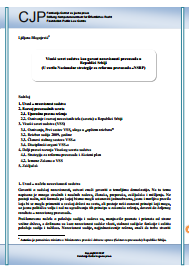Visoki savet sudstva kao garant nezavisnosti pravosuđa u Republici Srbiji (U svetlu Nacionalne strategije za reformu pravosuđa –NSRP)
High Council of Justice as a Guarantor of Judicial Independence in the Republic of Serbia (In the light of the National Strategy for Judicial Reform - NSRP)
Author(s): Ljiljana Blagojević
Subject(s): Law, Constitution, Jurisprudence, Constitutional Law, Public Law
Published by: Fondacija Centar za javno pravo
Keywords: Public law; judiciary; independence; VSS; NSRP; High Council of Justice; development; reform; strategy; VSS law; constitution;
Summary/Abstract: An independent judiciary is an ideal, which all the state of modern democracy tend to develop. Principles like Judicial Tenure, appointment and dismissal of judges, their immunity and status are accepted by a large number of states to promote the independence of judiciary. In the last decades of the 20th century, there has been an increasing number of states that are introducing the specialized bodies, which are independent of the other branches of authority. Those specialized bodies are the judicial councils. They guarantee the independence of the judiciary, and they are composed primarily of judges. They are in charge for organizing the courts functioning as well as for financial issues, the training of judges, and their selection, promotion and accountability. In Serbia, the permanency of the judicial function was guaranteed even before the adoption of the Constitution in 2006, but there has been great influence of both the legislative and executive authorities of government. The National Assembly was electing and dismissing judges and the changes in this area started the first years of the 21th century, by introducing of the High Personnel Council and the Supervisory Board of the Supreme Court of Serbia, and the High Council of Justice. That was the beginning of the creation of an independent body that would guarantee the independence of judges and their accountability. However, the past two decades in Serbia were marked by frequent changes in organizational law, which are next to the wars in the region, as well as the economic crisis, contributed to the overall uncertainty of the justice system and substantially dependent on the political situation in such circumstances. The High Judicial Council was established in the Constitution of the Republic of Serbia that was adopted in 2006 as an independent body, which guarantees the independence of the judges. Law on the High Judicial Council was adopted in 2008. The Council consisted of 11 members. Members of the Council were minister of justice, president of Supreme Court of Serbia, president of Committee on the Judiciary, lawyer, law school professor and 6 judges elected by their colleagues. However, at the end of the 2008 in the Republic of Serbia so called Reelection or general election of judges were conducted, when almost one-third of the judges was left out of the justice system, although the Judicial Tenure is guaranteed by the Constitution. This process is carried out by the first composition of the High Judicial Council which was elected on the non transparent way, also was non transparent, and the judges who were not selected did not get a reasoned decision. Judges who did not passed the general election have filed an appeal and after three years the Constitutional Court of Serbia finally reacted and annulled the decision of the High Judicial Council, after which the judges were returned to the judicial function. The whole process was met with great conviction national and international attention and has been characterized as politically charged. A change occurred with the change of government in the Republic of Serbia. The National Judicial Reform Strategy and Action Plan for its implementation was adopted in 2013. The High Judicial Council has important place in this strategy and it is expected to be a quality change in the direction of greater independence of this body, and as well the independence of the judiciary. In addition to changes to the Law on the High Judicial Council, is the long- planned amend of Constitution of the Republic of Serbia, and changes in the composition of the High Judicial Council and its role in the judiciary. These amendments will among other things execute harmonization with EU standards on the independence of the judiciary, as well as other laws that are in the process of changes. It can be concluded that the direction of change was a good start and to greater judicial independence and accountability of judges which are anticipated unlike now the evident decline in the quality of justice and the reputation of the judicial profession. This responsibility will be in full, in accordance with the criteria prescribed by the High Judicial Council and the appointment, promotion and dismissal of judges will conduct High Judicial Council. Full independence is expected on field an independent budget for the courts. In this way the independence of the judiciary, in addition to all other warranties can reach the desired level.
Series: Fondacija Centar za javno pravo - Projekti
- Page Count: 19
- Publication Year: 2013
- Language: Serbian
- Content File-PDF
- Introduction

